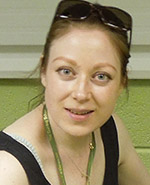Who we are
Prof Ilina Singh

Ilina Singh is Professor of Neuroscience & Society at the University of Oxford, where she holds a joint appointment between the Department of Psychiatry and the Faculty of Philosophy (Oxford Centre for Neuroethics and Uehiro Centre). Her work examines the psychosocial and ethical implications of advances in biomedicine and neuroscience for young people and families.
Recent projects include the ADHD VOICES project (www.adhdvoices.com); Neuroenhancement Responsible Research and Innovation (www.nerri.eu); and the Urban Brain Project (www.urbanbrainlab.com). In 2014, Professor Singh received a Wellcome Trust Senior Investigator Award for a study entitled: Becoming Good: Early Intervention and Moral Development in Child Psychiatry.
Professor Singh has published widely in eminent journals, including Nature, Nature Reviews Neuroscience, Social Science and Medicine, and the American Journal of Bioethics. She is the lead editor of a new volume: BioPrediction, Biomarkers and Bad Behavior: Scientific, Ethical and Legal Challenges (co-edited with Walter-Sinnott Armstrong and Julian Savulescu), published by Oxford University Press. She has acted as an advisor to the Nuffield Council on Bioethics, NICE, NIMH and other organisations. She is co-editor of the journal BioSocieties and on the editorial board of the American Journal of Bioethics-Neuroscience and Qualitative Psychology.
Lauren Baker

Working as Project Manager on the VOICES project, Lauren was involved in its final phase, including the final report and animated film.
A Sociology graduate from Warwick University, Lauren has worked with children for 14 years in a variety of capacities, including as a key worker, learning mentor and tutor. Her experience has involved working with children and young people with: special educational needs (SEN), at risk of social exclusion and crime, emotional and behavioural difficulties (EBD), autism spectrum (ASD), and those diagnosed with ADHD. Lauren is also interested in feminist research and was involved with the PE:ER Project at Eaves, where she assisted with the final report examining women's experiences of exiting prostitution.
Previously working as the Special Projects Officer at the Department of Social Science, Health and Medicine at King’s College London, Lauren is currently a freelance research assistant, and copy-editor for BioSocieties.
Imre Bard

Imre is a research assistant on the VOICES project. His main responsibilities include data management and analysis, as well as maintenance of the VOICES website. He's a Philosophy graduate from the University of Vienna and holds an MSc in Biomedicine and Society from LSE. Imre also works with Dr. Singh on research projects about human enhancement technologies and he is particularly interested in cognitive enhancement.
Caitlin Connors
Caitlin graduated from the BIOS MSc program in 2008, in which she focused her work on ethical, legal and social implications of modern neuroscience. She has previously obtained research training in neuroimaging (fMRI) at Yale University, where she worked with autistic and typically developing adolescents at the Yale Child Study Center under the supervision of Dr. Robert Schultz [now at UPenn]. Caitlin received undergraduate training in neuroscience, clinical psychology and English literature at Kalamazoo College in the United States. She has also worked in a variety of research positions in cognitive and clinical psychology at the University of Michigan and Drexel University. Interests include child clinical psychology; the ethical, legal and social implications of neurotechnologies and neuro-pharmaceutical; pharmaceutical enhancement; and forensic DNA database ethics and management.
Katie Thomas

Originally from Rochester, New York, Katie moved to London in 2008 to study a Masters degree in Biomedicine & Society at the London School of Economics which she completed in August, 2009. Her research focused on electroencephalogram (EEG) technicians' attitudes regarding psychogenic seizures, or seizures of psychological origin. Broadly speaking, she is interested in the sociology of contested illness and culture-bound psychiatric illness. Before moving to London, Katie worked at a New York state hospital's neurophysiology lab performing EEG's on patients suffering from seizures and other neurological disorders. She also worked as research assistant for "Pediatric Links with the Community", a community paediatrics centre for new doctors rotating through paediatric residency.
Sinead Keenan

After completing her undergraduate degree in Psychology at Trinity College Dublin, Sinéad moved to London in 2004 to undertake a Masters in Social Psychology at the London School of Economics. She subsequently went on to work at the Research Unit of the Royal College of Psychiatrists where her work included quality improvement in psychiatric services and running a scoping study for the Improving Access to Psychological Therapies (IAPT) programme. From there, Sinéad returned to LSE in 2007 to work as the first Research Assistant on the VOICES project. During this time she was closely involved with recruiting participants and the data collection process. Sinéad has since moved into consulting and now works as a Solutions Executive at the Mind Gym designing and delivering psychologically-based learning and development solutions to clients.
Zoe Given-Wilson

Zoe Given-Wilson has a background in both clinical and research psychology. She supported the VOICES project in the capacity of a Clinical Research Officer with the Mental Health Research Network. In this role she assisted in the recruitment and interviews of children with a diagnosis of ADHD. She completed a B. Psychology (hons) at Macquarie University, Australia and a MSc. Medical Anthropology at University College London. She is currently completing her D. Clinical Psychology, also at University College London.